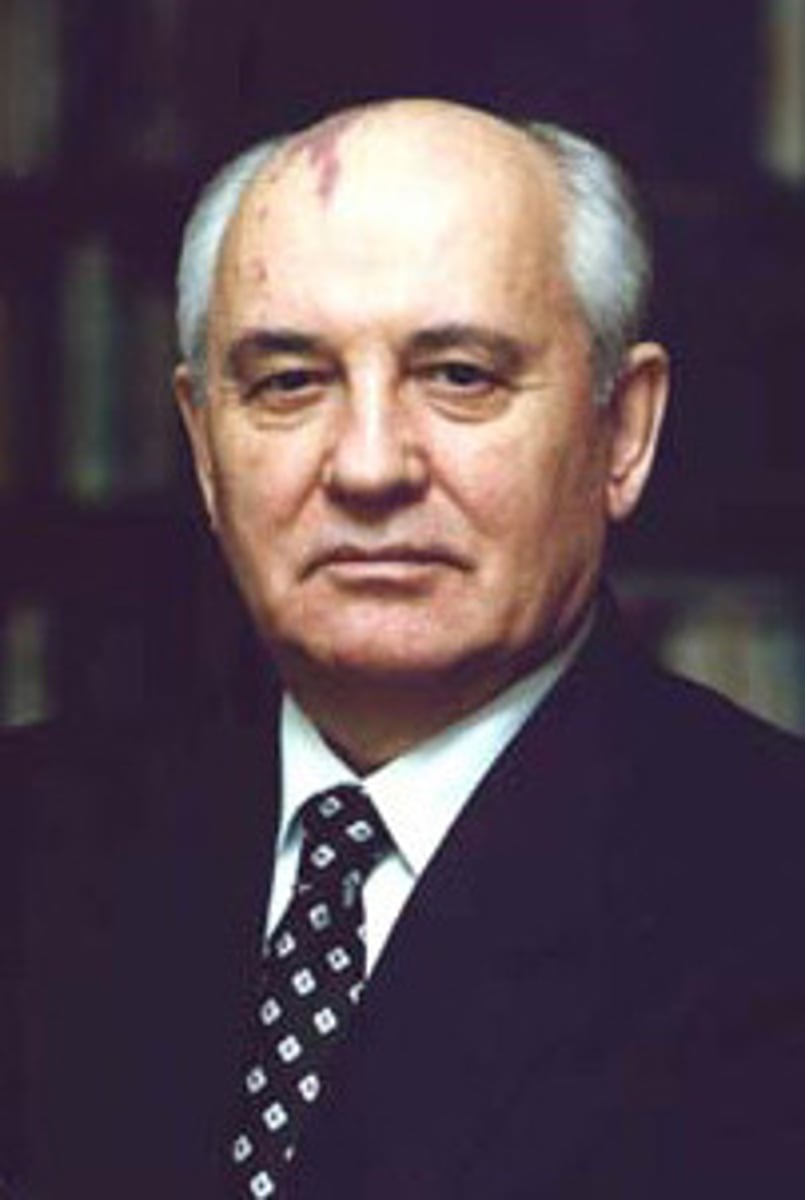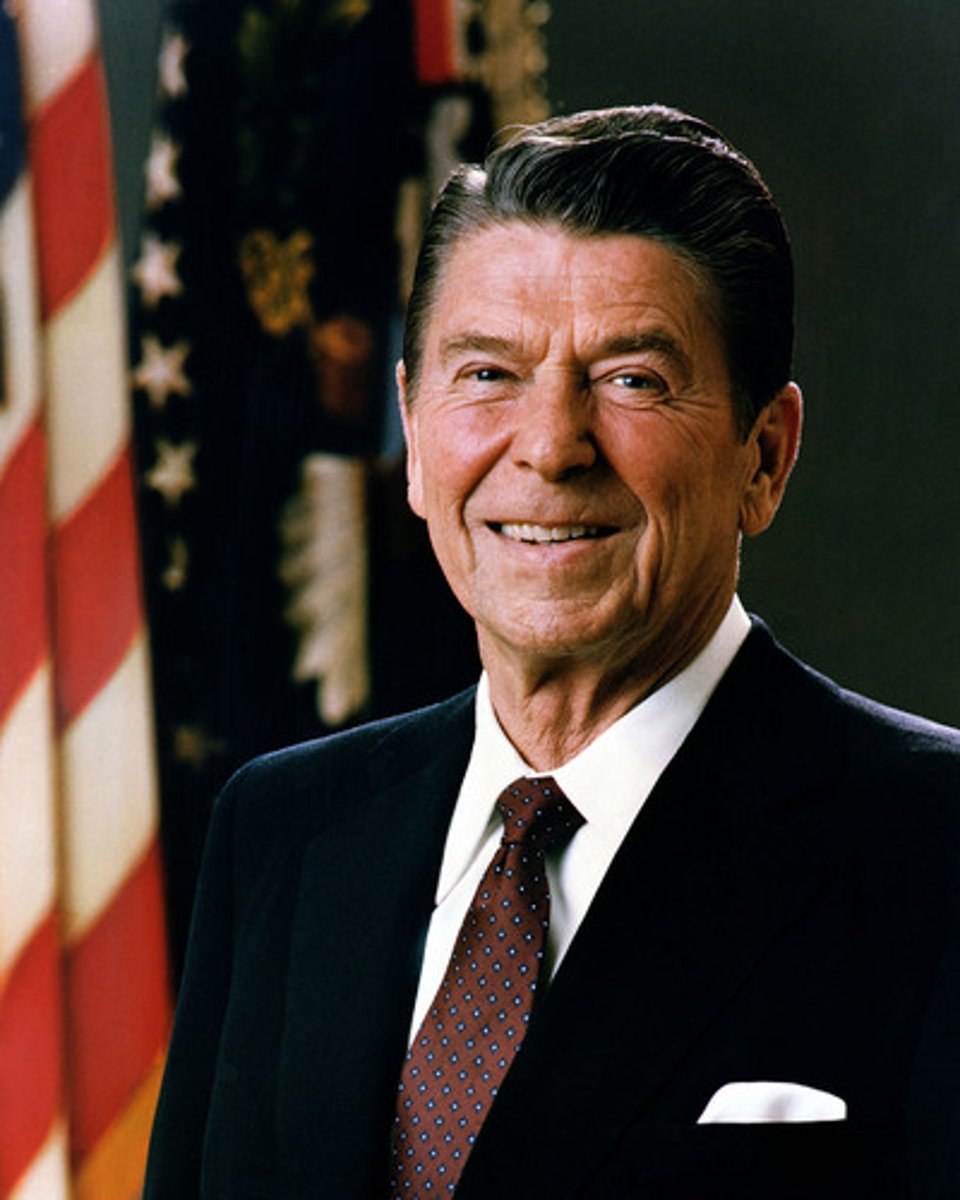Unit 12: End of the Cold War
1/28
There's no tags or description
Looks like no tags are added yet.
Name | Mastery | Learn | Test | Matching | Spaced |
|---|
No study sessions yet.
29 Terms
President Nixon travels to China
Occurring in 1972, it was significant because it recognized a communist power that previously had not been recognized. Example of the U.S. policy of detente.
detente
A U.S. policy of reducing Cold War tensions with its two major communist rivals - the Soviet Union and China; it was adopted during the presidency of Richard Nixon.
Mikhail Gorbachev
Soviet leader that saw improved relations with Reagan, instituted glasnost and perestroika which helped lead to the downfall of the Soviet Union

Ronald Reagan
Republican president of the U.S. from 1981-1989, he was nicknamed the "Great Communicator." He was anti-Communist, moved away from the policy of detente, and played a major role in helping end the Cold War. He was known for his economic plan of "Trickle-Down Economics" and served during the Iran-Contra Affair.

Solidarity Movement
Led by Lech Walesa, it was the first independent labor union in any country in the Warsaw Pact under Soviet communist control. The union used peaceful civil resistance for workers rights and social change against the oppressive communist government. Due to the social movement, partially free elections in Poland took place in 1989 and after the fall of the Soviet Union, the union's leadership took power in Poland. This movement was one of the first movements in a Soviet satellite nation to challenge the communist government.
Intermediate-Range Nuclear Forces
a 1987 agreement between the United States and the Soviet Union that eliminated some weapons systems and allowed for on-site inspection of military installations
glasnost
Policy of openness initiated by Gorbachev in the 1980s that provided increased opportunities for freedom of speech, association and the press in the Soviet Union.
perestroika
Economic policy initiated by Gorbachev in the 1980s that involved restructuring of the social and economic status quo towards a market-based economy and society in the Soviet Union.
OPEC
Organization formed by oil-producing countries to control the supply and set prices. It was used as a political weapon when they imposed an oil embargo on the U.S. for siding with Israel in the 1973 war.
Arab-Israeli Conflict
Hostilities initiated by Palestinians and other Muslim nations in the Middle East against Jewish Israelis beginning after the creation of Israel in 1948.
oil embargo of 1973
Arab members of OPEC restricted energy exports to the US in retaliation for US support of Israel in the Yom Kippur War between Israel and its Arab neighbors; led to higher prices and gasoline shortages
Camp David Accords
The first signed agreement between Israel and an Arab country, in which Egyptian president Anwar Sadat recognized Israel as a legitimate state and Israeli Prime Minister Menachem Begin agreed to return the Sinai Peninsula to Egypt. Considered to be President Carter's greatest foreign policy achievement.
Oil crisis of 1979
The Shah (ruler) of Iran was overthrown, and the Ayatollah Khomeini came to power. He cut Iran's oil production, which reduced shipments of crude oil to the United States. Gasoline prices soared, and the American economy plunged into a recession. The recession brought double-digit inflation and sent interest rates up to 20 percent. Consumer confidence evaporated. It sent the car industry into a depression.
Iran hostage crisis
Incident in which Iranian radicals, with government support, seized 52 Americans from the US embassy and held them for 444 days. Carter's unsuccessful efforts to negotiate their release contributed to his failed reelection bid in 1980. The Americans were not released until his last day of office.
Watergate Scandal
A scandal involving an illegal break-in at the Democratic National Committee offices in 1972 by members of President Nixon's reelection campaign staff. Before Congress could vote to impeach Nixon for his participation in covering up the break-in, Nixon resigned from the presidency.
Iran-Contra Affair
Scandal in the mid-1980s during Reagan's 2nd term as president involving secret U.S. sales of weapons to Iran in an attempt to secure the release of U.S. hostages held in Lebanon in 1986. Money from the arms sales was used to aid the Contras (anti-Communist insurgents) in Nicaragua, even though Congress had prohibited this assistance. Talk of Reagan's impeachment ended when presidential aides took the blame for the illegal activity.
Realpolitik
"realistic politics," power more important than principles; foreign policy under Nixon's Secretary of State Henry Kissinger
Nixon's Southern Strategy
Nixon tried to attract southern conservative democrats by appealing to their unhappiness with federal desegregation policies and a liberal Supreme Court. Focused on law and order, military strength, and appealed to Southern Whites.
Silent Majority
A phrase used to describe people, whatever their economic status, who uphold traditional values, especially against the counterculture of the 1960s
Strategic Arms Limitation Talks (SALT I and II)
Two sets of agreements reached during the 1970s between the United States and the Soviet Union that established limits on strategic nuclear delivery systems.
Strategic Defense Initiative (SDI)
Popularly known as "Star Wars," President Reagan's SDI proposed the construction of an elaborate computer-controlled, anti-missile defense system capable of destroying enemy missiles in outer spaced. Critics claimed that SDI could never be perfected.
supply-side economics
An economic philosophy that holds the sharply cutting taxes will increase the incentive people have to work, save, and invest. Greater investments will lead to more jobs, a more productive economy, and more tax revenues for the government. Promoted during Reagan's administration to reduce the size of the federal government. Also known as trickle down economics; critics called it voodoo economics
Yom Kippur War (1973)
Frustrated by their losses in the Six-Days War, Egypt and Syria launched a surprise attack on Israel during the Jewish holiday of Yom Kippur on October 6, 1973. Israel counterattacked, won a decisive victory, and had even occupied portions of northern Egypt.
Soviet-Afghan War
The Soviets invade Afghanistan in 1979, many people support Afghanistan through the context of the Cold War and to prevent the spread of Communism. After nine years, Afghanistan wins with the help of the US. Big defeat for the USSR.
Iran-Iraq War (1980-1988)
The war began over territorial disputes. Fighting spread throughout the Gulf region and the United States was dragged into the conflict several times, either being attacked or attacking hostile targets. The war ended in 1988, as Iraq began preparing to invade Kuwait. The area remained a volatile region.
Carter Doctrine (1980)
The policy proclaimed by President Carter in his State of the Union Address on January 23, 1980, which stated that the United States would use military force if necessary to defend its national interests in the Persian Gulf
Reagan Corollary
Expanded Carter Doctrine to include Saudi Arabia
U.S. v. Nixon (1974)
Key Supreme Court ruling on power of the president, finding that there is no absolute constitutional executive privilege to allow a president to refuse to comply with a court order to produce information needed in a criminal trial.
Reagan's War on Terrorism
1986 United States launches air strikes against Libya in retaliation for the Libyan sponsorship of terrorism against American troops and citizens. The raid, involved more than 100 U.S. Air Force and Navy aircraft, and was over within an hour. Five military targets and "terrorism centers" were hit, including the headquarters of Libyan leader Muammar al-Qaddafi.